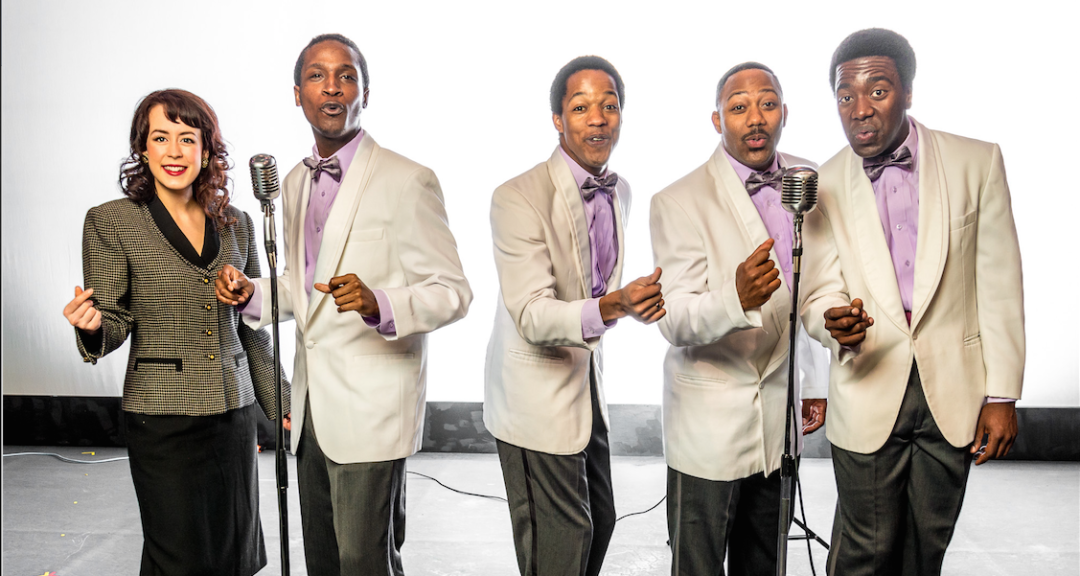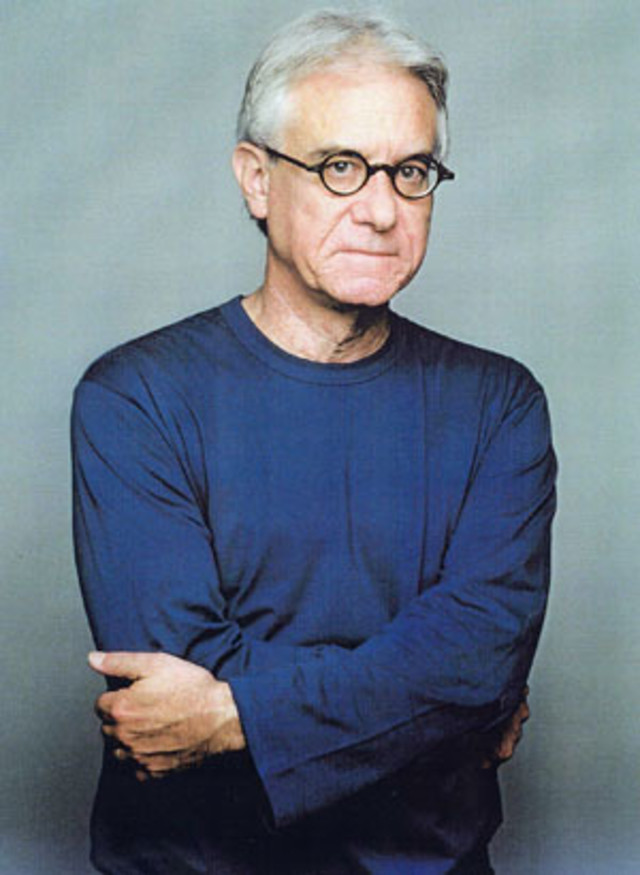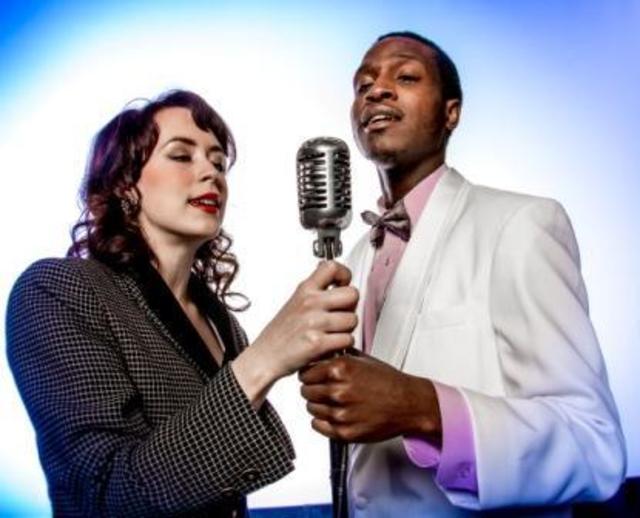Watch the Birth of Rock-N-Roll on a Portland Stage Near You

The cast of Soul Harmony. Photo credit: Paul Fardig
Rock critic, writer and columnist Greil Marcus—author of books on Dylan, Van Morrison and The Doors among others, and Rolling Stone magazine’s first ever reviews editor—is bringing his rock chops to Portland. He’ll be taking the mic at the Brunish Theatre on Thursday at noon ahead of the opening night—and world premiere—of a new, made-in-Portland musical called Soul Harmony.

Greil Marcus by Thierry Ardit, Paris
So what brings a legendary music writer and a PDX-penned production together? Turns out it’s a Jewish songwriter named Deborah Chessler, who played a key part in the rhythm and blues boom in the late 1940s. Chessler’s relationship with doo-wop sensation The Orioles helped bring R&B to the masses and spawn a whole new genre in rock 'n' roll, and her story is given theatrical treatment in Stumptown Stages' new production, Soul Harmony. According to one of its creators, Alan Berg—he co-wrote Soul Harmony with Janet Mouser—it was a 1993 Marcus essay on Chessler that inspired the show.
Ahead of his Portland trip, we asked Greil Marcus why we should we pay attention to Deborah Chessler.
“Because she was an extraordinarily brave person,” says Marcus. “A young person who had been forced to drop out of high school because she ran off and got married when she was 17 to a guy who turned out to be a wastrel and a bully… and in the middle of that she begins writing songs.”
She wasn’t just writing songs, however, she was looking for people to sing them too. “She starts going to Loew’s Capitol Theater in Washington, DC where all the great black singers would perform. She would make her way backstage and go up to the singers and say she had a song for them. For a young white Jewish woman in Baltimore in 1946 and 1947, when Baltimore and Washington DC were both completely segregated – black people weren’t allowed into downtown hotels and restaurants and even shops, Jews were also discriminated against and not allowed to use public pools—she is just barreling through that.”
But for Marcus, Chessler is also notable for her talent, a songwriting ability that has this longtime rock critic still gushing. “She actually has the ability to write songs that, instead of just being a standard love song, a standard pledge of romantic fidelity or maybe a song of loss … everything she writes has an element of doubt in it, an element of uncertainty.”
For Greil, who met with Chessler several times before her 2012 death, these notes of uncertainty are what elevate her work. “In her everyday life, she’s managing The Orioles, or she’s going backstage at the Capitol Theatre trying to hustle songs, maybe going to New York to try and make contacts, or she’s working in a woman’s clothes store trying to sell dresses because she’s working on commission. She lives with her mother, her father’s long dead, they don’t have any money, and in the course of this she’s pushing and pushing. And yet when she writes songs—and sometimes songs just kind of come to her—then all of the fear, all of the uncertainty and doubt that’s surrounding her life that she’s been pushing aside, they all come flooding back, but they don’t come flooding back as an inchoate cry of misery, they come back as little works of art.”
Chessler combined this talent with some business acument, and became manager of The Orioles. “She’s a white female manager of five African American men, she’s travelling all over the east coast, even the south, with them in cars and station wagons, when you just don’t see a white woman with three black men in one car and two more following her in another. When cops see that, they think either she’s been kidnapped or she’s a prostitute. That’s what she has to face every single day when she’s on the road with the group.”
She was combating racism, sexism, and often just dodgy dealing. “She’s negotiating with crooked club owners trying to get out of paying the group. She has to be very tough, very smart, and fearless … she’s a small woman, she’s in her mid twenties, she’s maybe 5’3”, she’s got dark hair, she’s very pretty.” In short, she’s the last person most people in the late 1940s and early 1950s thought would be managing an all-black R&B group and penning some of their most memorable songs, among them 1948’s “It’s Too Soon to Know”.
It’s a song that, almost seventy years later, still resonates. “It’s the first record she made with The Orioles, and their best and their deepest and their most significant and influential,” says Marcus. “It was a shocking sound [at the time] – nobody had ever heard anything like it. People were confused, they were stunned. There was an immediate sense of a breach, of something new happening.”
Decades after the song was released—up for consideration as the first rock-n-roll song ever recorded—Chessler’s legacy lives on, and now has inspired a musical of her story.
“Her legacy is two-fold,” says Marcus. “One is simply having created a masterpiece. ‘It’s Too Soon to Know’ will be listened to as long as people listen to popular songs.” But the second part of her legacy, for Marcus, is how she came to define a new era of opening up, of relaxation and artistic expression, of not giving a damn.

Monica Rodrigues and De'Sean Dooley as Deborah Chessler and Sonny Til in Stumptown Stages' Soul Harmony. Photo credit: Paul Fardig
“After the war, when people realized it was over, there was a kind of loosening up in American life. It’s like the country had been holding its breath ever since 1929, through the Depression and the war. It was only in 1948 that the country began to let out that breath, and all sorts of new things became possible,” he says. “All these things begin to break up around 1948 with the splintering of the Democratic party, with Jack Kerouac and Alan Ginsberg, those guys driving around the country doing all the things that ten years later would appear in On the Road and in Howl. All of the things that that poem and novel are about are happening in 1948. A Streetcar Named Desire opened with Marlon Brando shocking people with his sweaty mumbling, and violence. 'Too Soon to Know' is part of that.
"Things were breaking apart in this time...And part of it is a Jewish woman, and five guys not giving a damn what anybody thinks.”
Now Portland audiences get a chance to experience the story of that Jewish woman and her five black musical collaborators— with The Orioles singer Sonny Til played by his own grandson, De' Sean Dooley—in a world premiere of Soul Harmony.
Performances April 16 through May 3, 2015 at Brunish Theatre, Antoinette Hatfield Hall.
Greil Marcus will be speaking at Brunish Theatre at noon on Thursday. Entrance is free.
